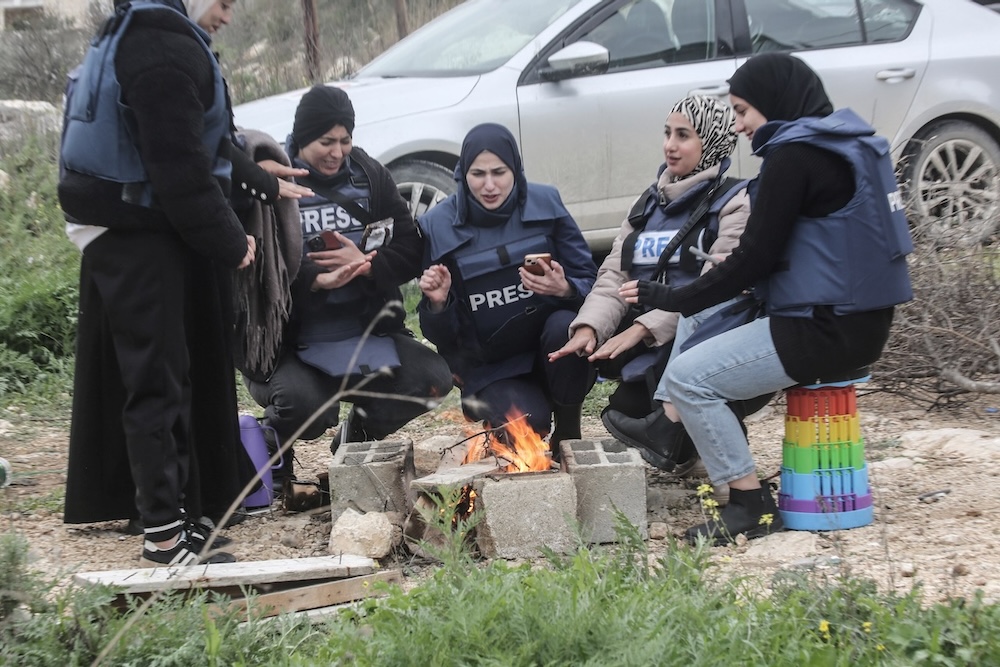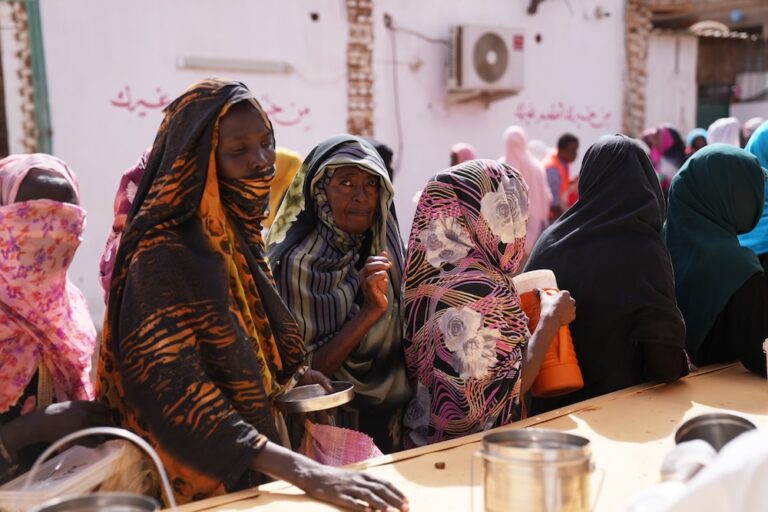MENA: A free expression and civic space round-up produced by IFEX's Regional Editor Naseem Tarawnah, based on IFEX member reports and news from the region.
In the face of escalating repression in the region, civil society is launching legal challenges, advocating for media freedoms, and spearheading initiatives to ensure accountability and defend civic space.
Fighting gendered violence in MENA
Marking International Women’s Day on 8 March, IFEX and its network spotlighted the threats facing women journalists and human rights defenders, as well as the crucial pushback efforts that stress the need for stronger protections and continued advocacy to safeguard women’s rights to free expression.
The Gulf Centre for Human Rights (GCHR) issued a statement emphasising the resilience of women human rights defenders in the region and called for increased international solidarity and adequate funding to ensure their continued work. Maharat Foundation detailed the alarming rise in cyber violence against Lebanese women journalists, underscoring the need for stronger legal protections.
Reporters Without Borders (RSF) marked the day by focusing on the harsh realities for women journalists facing systemic gendered violence in Syria, drawing attention to the case of journalist Hanin Gebran – released after nearly six months in detention – and renewing calls for justice for those persecuted under the former regime.
The Palestinian Center for Development and Media Freedoms (MADA) released a report detailing the repression of Palestinian women journalists by Israeli forces. A visual series by Visualizing Palestine exposed the gendered impact of Israeli violence, highlighting the historical role of women in resisting settler colonialism and advocating for justice. Meanwhile, The Arab Center for the Advancement of Social Media (7amleh) amplified its digital guides addressing the widespread and systematic doxxing of Palestinian women in an effort to silence their voices online.
Palestine: Defending media, combating incitement, and reconnecting Gaza
As the late Palestinian writer and poet Refaat Alareer, tragically killed in an Israeli airstrike on 6 December 2023, wrote: “What usually happens in occupied Palestine is that Palestinians cease, and Israel fires.” This stark reality has unfolded once again in recent weeks as Israel resumed its genocidal campaign in Gaza, where journalists reporting on the harrowing scenes continue to be primary targets in one of the deadliest environments for the press.
In February, figures documented by the Committee to Protect Journalists (CPJ) revealed that among the record number of journalists killed worldwide in 2024, Israel was responsible for over 70% of casualties.
This year has offered no reprieve. On 24 March, an Israeli airstrike resulted in the deaths of two Palestinian journalists, Hossam Shabat and Mohammed Mansour. CPJ called for an independent international investigation into these attacks. According to MADA, a subsequent airstrike in Beit Lahia, which killed four more journalists including Bilal Abu Matar, was reportedly preceded by targeted surveillance of the journalists’ vehicle.
With attention focused on Gaza, Israel’s escalations in the West Bank intensified. On 24 February, Israel forces deployed tanks in the West Bank for the first time in 20 years, expelling an estimated 40,000 Palestinians from their homes in the Israeli-occupied territories.
Amid rising settler attacks backed by Israeli authorities, and growing annexation threats of the Palestinian territories, the operations have coincided with a sharp escalation of restrictions on independent media. Palestinian journalists faced increased physical attacks, arrests, and movement restrictions, with IFEX members ARTICLE 19 and RSF warning that these measures risk transforming the region into a “news desert”.
Just weeks after No Other Land won an Oscar for documenting the violent expulsion of Palestinians in the West Bank village of Masafer Yatta, one of its co-directors, Hamdan Ballal, became a victim of the violent ethnic displacement the film exposes. The filmmaker was brutally attacked in his home by 15 settlers, then detained by Israeli forces for allegedly “hurling rocks” at them. His co-director, Basel Adra, recalled, “While soldiers pointed their weapons at us, settlers attacked Palestinian homes.” Amid growing calls for his release, Ballal was freed from Israeli custody a day later – while the Academy of Motion Pictures, so quick to honour the film just weeks earlier, remained notably silent.
Digital censorship, rising hate speech, and reconnecting Gaza
The US and European governments blocked Al-Aqsa TV from satellite broadcasts – a decision condemned by MADA as a violation of media rights. A report by 7amleh detailed discriminatory practices within Israel’s digital infrastructure that restrict Palestinians’ access to essential public services. In a push for an independent and secure Palestinian ICT sector, 7amleh is spearheading a campaign with civil society organisations to #ReconnectGaza. The global campaign highlights how digital isolation has exacerbated the humanitarian crisis, cutting off millions from emergency services and global communication.
According to 7amleh’s latest Racism and Incitement Index, over 12.4 million posts in Hebrew inciting violence on social media platforms were recorded last year, averaging a staggering 23.6 posts per minute. A significant portion of this content celebrates Palestinian deaths, further deepening the normalisation of violence against Palestinians. Despite repeated warnings from civil society groups about the failure of social media platforms to curb anti-Palestinian hate, the issue remains inadequately addressed, further fueling real-world harm.
Syria’s uncertain transition, and monitoring information restrictions
The February National Dialogue Conference brought Syrian civil society together, but as IFEX member the Cairo Institute for Human Rights Studies (CIHRS) notes, its rushed format and lack of concrete outcomes left the reform agenda largely unresolved. Concerns over a hastily formed preparatory committee – many figures received invitations less than 48 hours prior to the event – and limited diversity underscored the need for a more inclusive process. CIHRS called for immediate, transparent actions to ensure a democratic transition – urging the international community to address external threats, lift sanctions, and empower civil society.
Meanwhile, Syrian authorities continue confiscating communication equipment, including Starlink devices, and enforcing strict measures to curb digital expression. IFEX member Social Media Exchange (SMEX) is closely tracking developments, providing critical updates on internet access and online freedom.
Authorities continue to target journalists amid escalating violence. CPJ documented multiple attacks on news crews, including a shooting that injured an Al Jazeera journalist, prompting calls for the urgent media protections. These violations occurred as fierce clashes broke out on 6 March in Latakia, when al-Assad loyalists ambushed government forces, leading to reported revenge killings of Alawite civilians in a massacre of hundreds of people in just four days.
Sudan’s growing demands for accountability
In March, Sudan’s army regained control of Khartoum, retaking the presidential palace and delivering a significant blow to the rival paramilitary group, the Rapid Support Forces (RSF).
Despite these territorial gains, human rights abuses perpetuated by all warring parties persist. The UAE-backed RSF, responsible for mass detentions and ethnic violence, remains a potent threat – especially to civil society. In a targeted drone strike during the palace takeover, three Sudanese state television journalists were killed by the RSF.
In international accountability efforts, Sudan filed a genocide case against the UAE at the International Court of Justice, accusing the Gulf state of arming RSF fighters involved in widespread atrocities. Prominent Sudanese Activist Mohammed Farouk Suleiman remains detained in the UAE without charges since January, prompting calls for his immediate release and an end to such violations.
Bahrain and Saudi Arabia: Advocating for rights and accountability at HRC58
At the 58th session of the Human Rights Council (HRC58), IFEX members highlighted ongoing human rights violations in Bahrain, calling for urgent international intervention.
Authorities’ crackdown on dissent remains as severe as ever. Human rights defender Ali Al-Hajee, having previously served over 10 years for participating in peaceful protests, was detained again in March over social media posts exposing abuses in Bahraini prisons and advocating for prisoners’ rights. IFEX joined 24 rights groups demanding his immediate release, which fortunately came 11 days after his arrest.
At the HRC58, Americans for Democracy and Human Rights in Bahrain (ADHRB) spotlighted Al-Hajee’s case along with that of Naji Fateel, another prominent human rights defender. ADHRB expressed grave concerns over the ongoing reprisals against human rights defenders and opposition leaders, calling for an end to their unjust detentions.
The Bahrain Center for Human Rights (BCHR) hosted a side event to address Bahrain’s human rights crisis, spotlighting systematic repression, arbitrary detentions, and transnational surveillance. BCHR Director Nedal Al Salman shared her personal experience as a woman human rights defender, emphasising the constant harassment and legal persecution she has faced.
IFEX members have also urged EU intervention and demanded the immediate release of long-detained figures, especially those that are dual nationals like Abdulhadi Al-Khawaja and Sheikh Mohammed Habib Al-Muqdad, and other prominent political prisoners who have become stark symbols of systemic abuses.
Additionally, ADHRB released an eye-opening report on Bahrain’s persecution of minors for political dissent, detailing coerced confessions, prolonged detentions, and inhumane prison conditions. The organisation joined Human Rights Watch to launch an advocacy campaign urging US officials to push for diplomatic action on behalf of these victims.
In Saudi Arabia, a rare positive development was the release of women’s rights defender Salma Al-Shehab, who had been imprisoned for four years over her online free expression. According to GCHR, her release follows the recent freeing of several individuals, including social media influencers Abdulaziz Al-Oudah and Mansour Al-Ruqaiba, who had been held beyond their sentences. However, widespread repression and harsh sentences for peaceful protesters, activists, and vulnerable groups continue to cast a shadow over the country’s human rights landscape.
Despite reform pledges, discriminatory policies against Shia Muslims persist. In an intervention at HRC58, ADHRB detailed how Shia citizens are systematically barred from building mosques, sidelined from senior positions, and subjected to economic marginalization, while state curricula continue to promote hate speech against their beliefs.
In Brief
Lebanon: At the Lebanese Internet Governance Forum in February, Maharat Foundation hosted a session on “Safeguarding Digital Safety and Human Rights,” emphasising the modernisation of media laws amid AI-driven changes. The foundation also released a report highlighting restricted access to official sources and pervasive misinformation facing media workers.
Algeria: Authorities have imposed arbitrary travel bans on critics, including journalists and activists. Human Rights Watch and MENA Rights Group condemned these bans as violations of international law, while CIHRS joined a joint letter urging UNHRC members to act against the criminalisation of rights defenders and restrictive NGO laws.
Tunisia: A long-awaited trial began of 40 political opponents, activists, and lawyers accused of conspiring against the state – many detained for over two years without credible evidence. Human Rights Watch has called for the trial to be halted and for detainees to be released, warning that the case undermines Tunisia’s democratic progress.
Iraqi Kurdistan: GCHR’s latest periodic report on the region documents ongoing human rights violations, including the violent suppression of teacher protests in Sulaymaniyah. Four Media21 journalists were recently arrested and their office shut down, with CPJ linking the incident to a controversial interview that led to journalist Bashdar Bazyani’s detention.
UAE: The Federal Supreme Court upheld convictions in the “UAE84” case, handing life sentences to 43 individuals and 15-year terms to five others, including GCHR board member Ahmed Mansoor. GCHR condemned the ruling as an attempt to indefinitely silence critics, calling for urgent judicial reforms and improved prison conditions.



